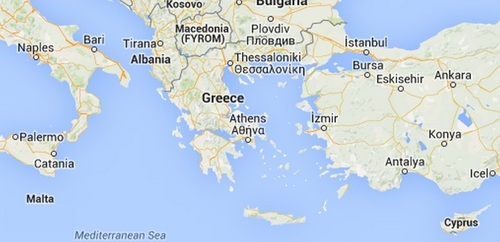Greece

Greece - State of CLIL
The state of language and content teaching in secondary education in Greece.English language learning is compulsory in secondary education in Greece, in both Highschool (3 grades) and Lyceum (3 grades). English is taught twice or three times a week, depending on the grade. Greek students, however, do not rely on the state sector to learn English. Most of them start attending English language lessons at a young age in private language institutions. By the time they enter Highschool, they have reached an intermediate level and most of them succeed in passing the FCE exams before continuing their studies in Lyceum.
The English language material used in class differs according to the choices the teachers make. The Ministry of Education has approved a number of coursebooks, published by Greek or International publishers, the syllabi of which reflect the philosophy and value systems of the Greek curriculum. The teachers can then choose the coursebook that serves the needs and suits the learning styles of their groups. A number of coursebooks have recently been introduced, which make curriculum links with other school subject areas. Their aim is, apart from developing the learners' language abilities, to help them broaden their knowledge of the world and develop cross-curriculum attitudes and abilities.
The content subjects in secondary schools are taught by university graduates of the related speciality. The problem with content teachers is that they are placed in state schools without having received any teacher training in advance. Therefore, most of the times, they continue the traditional teacher-centered organisation of instruction and rely on the lecture approach. The students, consequently, feel quite demotivated and have problems coping with the specific material. The integration of language and content material appears, then, as an option to motivate and help students assimilate the knowledge they receive. Although such an integration may be well-received in Highschools, it would be almost impossible to be realised in Lyceums. The reason is that students are prepared for the University Entrance Exams in Lyceum, which means that both teachers and students face a demanding syllabus and no time is provided for experimentation.
Recently, a pilot project has been announced on the cross-curricular approach based on the Lisbon treaty, which was signed by the EU members in March 2000. In this project, English language and content teachers will cooperate in a series of experimental lessons and will evaluate at the end both the materials used and the success of the venture.
In the tertiary level, there is no instruction of content in English. Only, in a number of private colleges, students complete their degree in English, especially in courses related to Business and Economics.
Faye Papagermanou
Science Across the Balkans
Plovdiv
THE STATE OF LANGUAGE AND CONTENT TEACHING IN PRIMARY SCHOOLS IN GREECE
by Evie Kokka
In the state primary schools of Greece, English is taught as a foreign language from the 4th year. Private schools start EFL instruction from the first year. However, due to a long established tradition, students entrust their learning a foreign language to private language institutions (frontisteria). These prepare learners for international examinations –mostly those of Cambridge University. The introduction of English to primary schools (about 15 years ago) lowered the age at which children start English at frontisteria. This is why Greek candidates for the UCLES examinations are among the youngest worldwide. The problem with this situation is that the vast majority of students and their parents, rely on frontisteria and underestimate the role of English teaching at school.
There are three 45-minute lessons per week for three years. The basic instruction material is a coursebook series at 3 levels, which was produced by the Pedagogical Institute of the Ministry of Education. Fortunately, there are no limitations concerning the amount of the material to be covered. This allows them to adapt the coursebook, to use supplementary materials and experiment.
On the other hand, all content subjests are taught by primary school teachers who have to cope with a very tight curriculum, which does not leave any time for extra activities. For this reason, primary teachers are not willing to depart from their coursebooks and rarely cooperate with each other and practically never with the teacher of English.
Integration of content and language teaching would be a good idea for primary students because the teaching of content subjects and the related books do not have any learner training orientation. Consequently, students have difficulty in learning content material and are utterly at a loss when they have to memorise events in History or names in Geography. Moreover, they do not acquire thinking skills or self-study techniques.
The application of ELT techniques to the teaching of content lessons could help primary students to develop the necessary strategies for coping with content material. Conversely, the use of content material in the English classroom could offer new scope to EFL and change the attitude of students towards learning English at school.